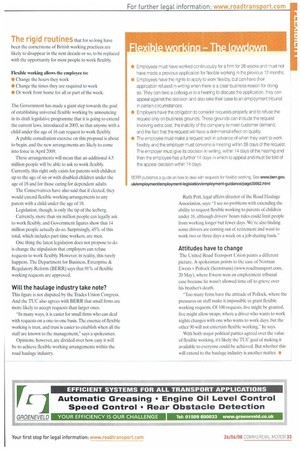Your flexible friends?
Page 32

Page 33

If you've noticed an error in this article please click here to report it so we can fix it.
The Government is extending the right to work flexibly, but is the transport industry less tolerant than more enlightened areas?
Words: Mike Sherrington The rigid routines that for so long have been the cornerstone of British working practices are likely to disappear in the next decade or so, to be replaced with the opportunity for most people to work flexibly.
Flexible working allows the employee to: • Change the hours they work • Change the times they are required to work • Or work from home for all or part of the week.
The Government has made a giant step towards the goal of establishing universal flexible working by announcing in its draft legislative programme that it is going to extend the current laws. introduced in 2003, so that anyone with a child under the age of 16 can request to work flexibly.
A public consultation exercise on this proposal is about to begin, and the new arrangements arc likely to come into force in April 2009.
These arrangements will mean that an additional 4.5 million people will be able to ask to work flexibly. Currently, this right only exists for parents with children up to the age of six or with disabled children under the age of 18 and for those caring for dependent adults The Conservatives have also said that if elected, they would extend flexible working arrangements to any parent with a child under the age of 18.
Legislation, though, is only the tip of the iceberg.
Currently, more than six million people can legally ask to work flexibly, and Government figures show that 14 million people actually do so. Surprisingly, 45% of this total, which includes part-time workers, are men.
One thing the latest legislation does not propose to do is change the stipulation that employers can refuse requests to work flexibly. However, in reality, this rarely happens. The Department for Business, Enterprise & Regulatory Reform (BERR) says that 91% of flexible working requests are approved.
Will the haulage industry take note?
This figure is not disputed by the Trades Union Congress. And the TUC also agrees with BERR that small firms are more likely to accept requests than larger ones.
"In many ways, it is easier for small firms who can deal with requests on a one-to-one basis. The essence of flexible working is trust, and trust is easier to establish when all the staff are known to the management," says a spokesman.
Opinions, however, arc divided over how easy it will be to achieve flexible working arrangements within the road haulage industry
Ruth Putt, legal affairs director of the Road Haulage Association, says: "I see no problems with extending the ability to request flexible working to parents of children under 16, although drivers' hours rules could limit people from working longer but fewer days. We're also finding some drivers are coming out of retirement and want to work two or three days a week on a job-sharing basis."
Attitudes have to change
The United Road Transport Union paints a different picture. A spokesman points to the case of Norman Ewens v Pollock (Scotstrans) (www.roadtransport.com, 20 May), where Ewens won an employment tribunal case because he wasn't allowed time off to grieve over his brother's death.
"Too many firms have the attitude of Pollock, where the pressures on staff make it impossible to grant flexible working requests. Of 100 requests, five might be granted, five might allow swaps, where a driver who wants to work nights changes with one who wants to work days, but the other 90 will not entertain flexible working," he says.
With both major political parties agreed over the value of flexible working, its likely the TUC goal of making it available to everyone could be achieved. But whether this will extend to the haulage industry is another matter. •








































































































































































